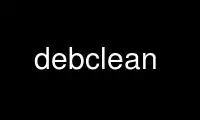
This is the command debclean that can be run in the OnWorks free hosting provider using one of our multiple free online workstations such as Ubuntu Online, Fedora Online, Windows online emulator or MAC OS online emulator
PROGRAM:
NAME
debclean - clean up a sourcecode tree
SYNOPSIS
debclean [options]
DESCRIPTION
debclean walks through the directory tree starting at the directory tree in which it was
invoked, and executes debian/rules clean for each Debian source directory encountered.
These directories are recognised by containing a debian/changelog file for a package whose
name matches that of the directory. Name matching is described below.
Also, if the --cleandebs option is given, then in every directory containing a Debian
source tree, all files named *.deb, *.changes and *.build are removed. The .dsc, .diff.gz
and the (.orig).tar.gz files are not touched so that the release can be reconstructed if
necessary, and the .upload files are left so that debchange functions correctly. The
--nocleandebs option prevents this extra cleaning behaviour and the --cleandebs option
forces it. The default is not to clean these files.
debclean uses debuild(1) to clean the source tree.
Directory name checking
In common with several other scripts in the devscripts package, debclean will walk through
the directory tree searching for debian/changelog files. As a safeguard against stray
files causing potential problems, it will examine the name of the parent directory once it
finds a debian/changelog file, and check that the directory name corresponds to the
package name. Precisely how it does this is controlled by two configuration file
variables DEVSCRIPTS_CHECK_DIRNAME_LEVEL and DEVSCRIPTS_CHECK_DIRNAME_REGEX, and their
corresponding command-line options --check-dirname-level and --check-dirname-regex.
DEVSCRIPTS_CHECK_DIRNAME_LEVEL can take the following values:
0 Never check the directory name.
1 Only check the directory name if we have had to change directory in our search for
debian/changelog. This is the default behaviour.
2 Always check the directory name.
The directory name is checked by testing whether the current directory name (as determined
by pwd(1)) matches the regex given by the configuration file option
DEVSCRIPTS_CHECK_DIRNAME_REGEX or by the command line option --check-dirname-regex regex.
Here regex is a Perl regex (see perlre(3perl)), which will be anchored at the beginning
and the end. If regex contains a '/', then it must match the full directory path. If
not, then it must match the full directory name. If regex contains the string ´PACKAGE',
this will be replaced by the source package name, as determined from the changelog. The
default value for the regex is: ´PACKAGE(-.+)?', thus matching directory names such as
PACKAGE and PACKAGE-version.
OPTIONS
--cleandebs
Also remove all .deb, .changes and .build files from the parent directory.
--nocleandebs
Do not remove the .deb, .changes and .build files from the parent directory; this
is the default behaviour.
--check-dirname-level N
See the above section Directory name checking for an explanation of this option.
--check-dirname-regex regex
See the above section Directory name checking for an explanation of this option.
--no-conf, --noconf
Do not read any configuration files. This can only be used as the first option
given on the command-line.
-d Do not run dpkg-checkbuilddeps to check build dependencies.
--help Display a help message and exit successfully.
--version
Display version and copyright information and exit successfully.
CONFIGURATION VARIABLES
The two configuration files /etc/devscripts.conf and ~/.devscripts are sourced in that
order to set configuration variables. Command line options can be used to override
configuration file settings. Environment variable settings are ignored for this purpose.
The currently recognised variables are:
DEBCLEAN_CLEANDEBS
If this is set to yes, then it is the same as the --cleandebs command line
parameter being used.
DEVSCRIPTS_CHECK_DIRNAME_LEVEL, DEVSCRIPTS_CHECK_DIRNAME_REGEX
See the above section Directory name checking for an explanation of these
variables. Note that these are package-wide configuration variables, and will
therefore affect all devscripts scripts which check their value, as described in
their respective manpages and in devscripts.conf(5).
Use debclean online using onworks.net services
